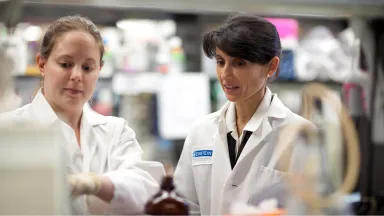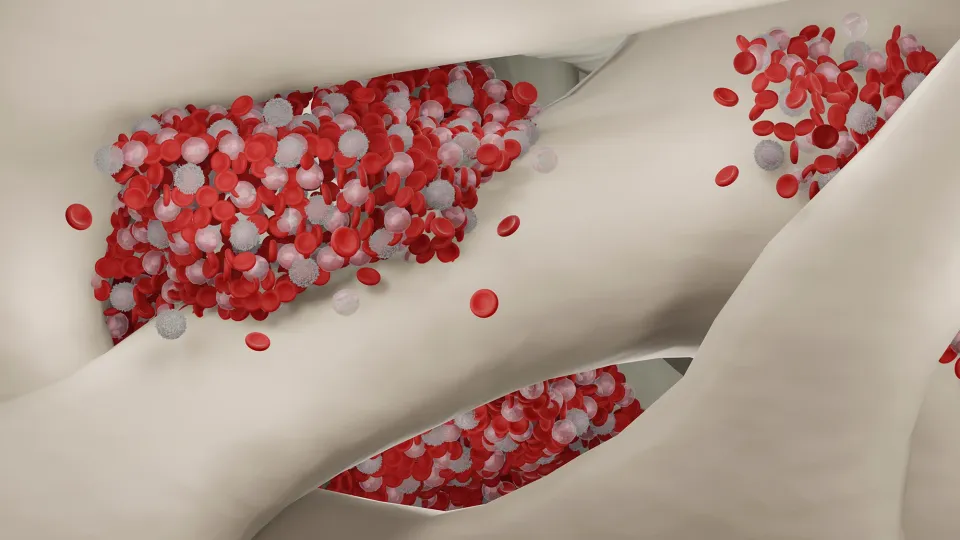
Kira Gritsman, M.D., Ph.D.
- Associate Professor, Department of Oncology (Medical Oncology)
- Associate Professor, Department of Medicine (Oncology & Hematology)
- Associate Professor, Department of Cell Biology
- Co-Leader, Montefiore Einstein Comprehensive Cancer Center, Stem Cell & Cancer Biology Program
- Betty and Sheldon Feinberg Senior Faculty Scholar in Cancer Research
Area of research
- roles of signaling pathways in hematopoietic stem cell self-renewal and differentiation, leukemic stem cells, targeting signaling pathways in hematologic malignancies
Phone
Location
- Albert Einstein College of Medicine Jack and Pearl Resnick Campus 1300 Morris Park Avenue Chanin Building 410A Bronx, NY 10461
Research Profiles
Professional Interests
The Roles of Signaling Pathways in Adult Blood Development and Leukemia
The Gritsman lab studies the signal transduction pathways that affect the early fate decisions of adult hematopoietic stem cells (HSCs) as they progress from an undifferentiated multipotent state to the generation of differentiated blood cells. When these early fate decisions go awry, this can lead to the formation of leukemia-initiating cells. We are interested in how signaling pathways affect the self-renewal and differentiation of HSCs and malignant or pre-malignant stem cells in myeloid malignancies, such as acute myeloid leukemia (AML), myelodysplastic syndrome (MDS), and myeloproliferative neoplasms (MPN).
Roles of the PI3 kinase isoforms in leukemia
Acute myeloid leukemia (AML) is a genetically diverse disease, but activation of the PI3K pathway has been reported in up to 80% of cases. PI3 kinase (PI3K) is a lipid kinase that is important for the regulation of metabolism, the cell cycle, apoptosis, and protein synthesis. In hematopoietic cells, there are four isoforms of the catalytic subunit of PI3K, each encoded by a separate gene. Emerging evidence suggests that these isoforms have unique functions in normal and cancer cells but may substitute for each other in some contexts. We have generated a series of mouse knockout models to study the roles of each of these isoforms individually in adult hematopoiesis. We found that inactivation of individual PI3K isoforms can be an effective way to target leukemic cells without excessive toxicity. We are also using cell lines, patient samples, and mouse models of leukemia to investigate the mechanisms of resistance to PI3K inhibition, with the goal of identifying new drug targets and designing new combination treatments for leukemia that incorporate PI3K inhibitors.
Roles of the PI3 kinase isoforms in myelodysplastic syndrome
To study the redundant roles of the PI3K isoforms in HSCs, we have also generated triple knockout mice with deletion of all 3 Class IA PI3K isoforms in HSCs. This leads to a phenotype with impaired HSC differentiation and increased chromosomal instability, resembling myelodysplastic syndrome (MDS). We are now studying the molecular mechanisms for how deletion of PI3K can impact normal HSC function, including self-renewal, proliferation, and differentiation along different blood lineages.
Member of the Cancer Dormancy and Tumor Microenvironment Institute
The Gritsman lab’s research interests include the contributions of signaling pathways to leukemic and pre-leukemic stem cell dormancy in minimal residual disease, which includes mechanisms of immune evasion. Furthermore, the Gritsman lab is interested in the roles of inflammatory signaling pathways and of the local bone marrow microenvironment in the regulation of HSC numbers at steady state and under stress, in bone marrow fibrosis, and in the evolution of myeloid neoplasms from the pre-malignant to malignant state. Our major goals are to identify opportunities for therapeutic targeting to prevent the transition from the pre-leukemic state to leukemia, or to eliminate minimal residual disease to prevent relapse.
RON Kinase in Myeloproliferative Neoplasms
The myeloproliferative neoplasms (MPNs) are a group of diseases that are caused by kinase mutations in HSCs, which lead to uncontrolled proliferation of myeloid cells. The Philadelphia chromosome-negative MPNs are characterized by mutations in the JAK/STAT signaling pathway, and respond to JAK inhibitors, but resistance often develops. We recently discovered that the receptor Tyrosine kinase RON can physically interact with JAK2 in MPN cells, leading to potentiation of JAK/STAT signaling in resistant cells. Furthermore, we found that pharmacologic or genetic inactivation of RON can inhibit proliferation of MPN cells and re-sensitize resistant cells to JAK inhibitors.
Selected Publications
Takeishi, S., Marchand, T., Koba, W.R., Borger, D.K., Xu, C., Guha, C., Bergman, A., Frenette, P.S.*, Gritsman, K.*, Steidl, U.1*, Haematopoietic stem cell numbers are not solely determined by niche availability Nature 2025 August 27th, DOI: 10.1038/s41586-025-09462-5
Marchand, T.*, Akinnola, K.*, Takeishi, S., Maryanovich, M., Pinho, S., Saint-Vanne, J., Birbrair, A., Lamy, T., Tarte, K., Frenette, P.S., Gritsman, K., Periosteal skeletal stem cells can migrate into the bone marrow and support hematopoiesis after injury, eLife2025, May 22;13:RP101714. doi: 10.7554/eLife.101714.PMID: 40401637
Wang Z, Skwarska A, Poigaialwar G, Chaudhry S, Rodriguez Meira A, Sui P, Olivier E, Jia Y, Gupta V, Fiskus W, Ramage CL, Zheng G, Schurer A, Gritsman K, Papapetrou EP, Bhalla K, Zhou D, Mead AJ, Rampal RK, Tyner JW, Abbas HA, Pemmaraju N, Tatarata QZ, and Konopleva M. Efficacy of a Novel BCL-xL Degrader, DT2216, in Preclinical Models of JAK2-mutated Post-MPN AML. Blood 2025 Jul 17;146(3):341-355. doi: 10.1182/blood.2024027117, PMID: 40163809
Mohammadhosseini,M., Enright, T., Duvall, A., Chitsazan, A., Lin, H-Y., Ors, A., Davis, B., Nikolova, O., Bresciani, E., Diemer, J., Craft, K., Menezes, C., Merguerian, M., Chong, S., Calvo, K., Deuitch, N., Glushakow-Smith, S., Gritsman, K., Godley, L., Horwitz, M.S., Keel, S., Castilla, L.H., Demir, E., Mohammed, H., Liu, P., and Anupriya Agarwal. Targeting the CD74 signaling axis suppresses inflammation and rescues defective hematopoiesis in RUNX1-Familial Platelet Disorder. Science Translational Medicine, Jan 8;17(780):eadn9832. doi: 10.1126/scitranslmed.adn9832. Epub 2025 Jan 8.PMID: 39772771
Luo Q, Raulston EG, Prado MA, Wu X, Gritsman K, Whalen KS, Yan K, Booth CAG, Xu R, van Galen P, Doench GJ, Shimony S, Long HW, Neuberg DS, Paulo JA, Lane AA. Targetable leukemia dependency on noncanonical PI3Kγ signaling. Nature2024May 8. doi: 10.1038/s41586-024-07410-3. PMID: 38720074
Ames, K., Kaur, I., Shi, Y., Tong, M., Sinclair, T., Hemmati, S., Glushakow-Smith, S.G., Tein, E., Gurska, L., Steidl, U., Dubin, R., Shan, J., Montagna, C., Pradhan, K., Verma, A., and Gritsman, K., Deletion of PI3-Kinase Promotes Myelodysplasia Through Dysregulation of Autophagy in Hematopoietic Stem Cells, Science Advances 2023. doi: 10.1126/sciadv.ade8222, PMID: 36812307
Folgado Marco, V., Ames, K., Chuen, J., Gritsman, K. & Baker, N., Haploinsufficiency of the essential gene RpS12 causes defects in erythropoiesis and hematopoietic stem cell maintenance, eLife 2023 Jun 5;12:e69322. doi: 10.7554/eLife.69322. PMID: 37272618
Gurska, L.M., Okabe, R., Schurer, A., Tong, M.M., Soto, M., Choi, D., Ames, K., Glushakow-Smith, S., Montoya, A., Tein, E., Miles, L.A., Cheng, H., Hankey-Giblin, P., Levine, R.L., Goel, S., Halmos, B., and Gritsman, K. Crizotinib has Preclinical Efficacy in Philadelphia-negative Myeloproliferative Neoplasms, Clinical Cancer Research 2022 Dec 20:CCR-22-1763. doi: 10.1158/1078-0432.CCR-22-1763. PMID: 36537918
Hemmati, S., Sinclair, T., Tong, M., Bartholdy, B., Okabe, R.O., Ames, K., Ostrodka, L., Haque, T., Kaur, I., Mills, T. S., Agarwal, A., Pietras, E.M., Zhao, J.J., Roberts, T.M., and Gritsman, K., PI3 kinase alpha and delta promote hematopoietic stem cell activation, JCI Insight 2019 doi.org/10.1172/jci.insight.125832
Hemmati, S., Haque, T., and Gritsman, K, Inflammatory Signaling Pathways in Pre-leukemic and Leukemic Stem Cells, Frontiers in Oncology 2017 Nov 13;7:265. doi: 10.3389/fonc.2017.00265
Yuzugullu, H., Baitsch, L., Von, T., Steiner, A., Tong, H., Ni, J., Clayton, L., Bronson, R., Roberts, T., Gritsman, K., and Zhao, J.J. A p110b-Rac signaling loop mediates Pten-loss-induced perturbation of hematopoiesis and leukemogenesis. Nature Communications October 7,2015, doi:10.1038/NCOMMS9501
Gritsman, K., Yuzugullu, H., Von, T., Yan, H., Clayton, L., Fritsch, C., Maira, S.-M., Hollingworth, G., Choi, C., Khandan, T., Paktinat, M., Okabe, R.O., Roberts, T.M., and Zhao, J.J. Hematopoiesis and RAS-driven myeloid leukemia differentially require PI3K isoform p110alpha. Journal of Clinical Investigation 2014;124(4):1794–1809. http://www.jci.org/articles/view/69927






